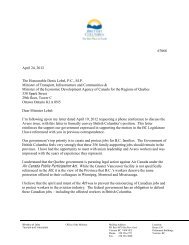from the ground up - The Tyee
from the ground up - The Tyee
from the ground up - The Tyee
You also want an ePaper? Increase the reach of your titles
YUMPU automatically turns print PDFs into web optimized ePapers that Google loves.
Excerpts <strong>from</strong> <strong>the</strong> ensuing discussion in <strong>The</strong> <strong>Tyee</strong>’s comment section:Green needs to be affordable to be widely adoptedposted by “rhea” on January 26, 2011While stories like this are really great for lettingpeople know what <strong>the</strong> ultimate possibilities are, <strong>the</strong>cost of building a house like this is out of reach formost families, so <strong>the</strong>y are likely to simply discount<strong>the</strong> entire thing as being “too expensive” or “greenwash”.Same reason so many people don’t buy s<strong>up</strong>erenergy efficient windows or heating systems. Ei<strong>the</strong>rthat or building codes are so restrictive that really efficientand cost effective buildings are not allowed (likehttp://earthship.com).It is very possible to build a highly energy efficienthome for <strong>the</strong> mass market. It’s also possible to encouragepeople to build and renovate green through<strong>the</strong> use of incentives. Look at how many people tookadvantage of <strong>the</strong> homeowner grant or <strong>the</strong> energyefficient grant. Changing building and tax codes tomake green building and renovating cheaper thantraditional renovations would do a lot more to solveclimate change than setting a standard too high formost people to achieve in <strong>the</strong> current market.What a lot of green cheerleaders miss is <strong>the</strong> fact thatwe have a lot of existing housing stock that’s notgoing away right now. We’re not going to tear downall <strong>the</strong> 50’s neighbourhoods to build passive houses.What can be done is to change taxes, codes and practicesto ensure that it’s cheaper to renovate this housingstock and make it as efficient as possible than tokeep building new McBurbs with crappy construction.Where new construction is put in, THAT should beheld to a higher standard.Some things I’d like to see:1) Permanent and significant tax breaks on all energyefficient <strong>up</strong>grades and new builds2) Energy efficient windows and heating etc. requiredin all new construction3) Public education, tax breaks and s<strong>up</strong>port for solar,wind and geo<strong>the</strong>rmal power4) All new construction required to incorporate solarpower, water conservation, geo<strong>the</strong>rmal heating andcooling or heat pumps where practical5) Less emphasis on building cookie cutter developmentsthat look exactly alike and perform like crapand more on building or renovating to a higher standard.<strong>The</strong>re’s tons more, but those are what I can think ofright now.Re: Green needs to be affordable to be widelyadoptedposted by “Bytesmiths” on January 26, 2011I agree that you have to be able to make an economicjustification, but I disagree that “green needs to be affordableto be widely adopted.”Ra<strong>the</strong>r, what is needed is a public education campaignto convince people that, in <strong>the</strong> long term, investingin a low-energy house is probably <strong>the</strong> best economicdecision <strong>the</strong>y will ever make.<strong>The</strong> basic problem is that we’re trained to make st<strong>up</strong>idcomparisons based on current prices. With comingcarbon taxes, “peak oil,” and <strong>the</strong> spectre of millionsof electric cars driving <strong>up</strong> electricity prices, it seemsa no-brainer to do whatever you can to reduce yourhome energy needs NOW!Consider that if you wait, <strong>the</strong> cost of <strong>the</strong> energyimprovements in going to go <strong>up</strong> in lock-step with <strong>the</strong>cost of energy. That will leave you “behind <strong>the</strong> eightball,” since you’ll not only be paying more for <strong>the</strong> energybetween now and when you decide to improve,but you’ll also be paying more for <strong>the</strong> energy <strong>up</strong>grade.Low-energy homes are ALWAYS going to cost more.<strong>The</strong> tough job ahead is to convince people that <strong>the</strong>cost is worth it.48








